New Study Reveals the Best Bedroom Temperature for Perfect Sleep
There's a temperature range that you should be aiming for.
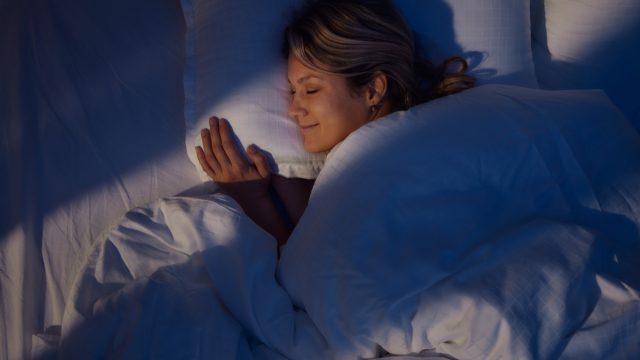
We tend to get defensive when the topic of temperature comes up, especially in regards to where we set the thermostat in our own homes. Some of us believe 68 degrees is the ideal mark, while others can't imagine ever letting it get below 70. If you're trying to get a good night's rest, however, science has an opinion on who's right and who's wrong. In fact, a new study has pinpointed a specific range you should be keeping your thermostat at, and it may surprise you. Read on to discover the exact bedroom temperature for perfect sleep.
RELATED: 6 Bedtime Routines That Will Help You Sleep Through the Night.
Experts have previously suggested the best temperature for sleep.
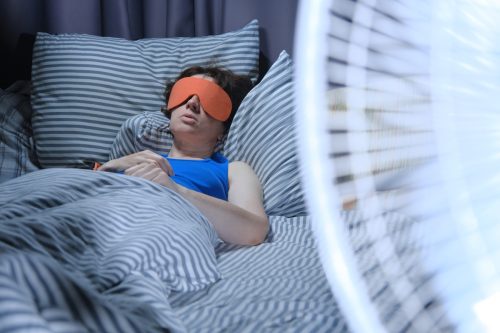
If you prefer chillier conditions when you go to bed, you'll likely appreciate the temperature recommendation of the National Sleep Foundation (NSF). The organization states on its website that a "dark, cool bedroom that is free of distractions is the ideal place to get a good night of sleep."
To help facilitate this, you should keep your room temperature somewhere between 60 and 67 degrees Fahrenheit, according to the NSF.
But now, new research is challenging the organization's range for perfect sleep.
RELATED: What Happens If You Take Benadryl Before Bed Every Night, Doctors Say.
A new study suggests turning up the heat.
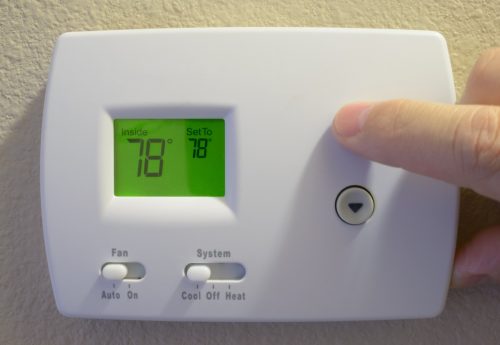
Researchers from Hebrew SeniorLife, an affiliate of Harvard Medical School, and the Arthur Marcus Institute for Aging Research have just discovered that the ideal range may be warmer than what the NSF suggests. In a new study published in the Science of The Total Environment journal, they sought to examine the "association between bedroom nighttime temperature and sleep quality" for older adults.
Using wearable sleep monitors and environmental sensors, the researchers monitored sleep duration, efficiency, and restlessness for nearly 50 older adults over the course of close to 11,000 nights of sleep. According to the study, sleep was "most efficient and restful" when the bedroom temperature was somewhere between 68 and 77 degrees Fahrenheit.
Poor sleep can negatively impact the health of older adults.

The study was specifically aimed at older adults because "poor sleep is disproportionately more common" among this age group, the researchers noted in a press release accompanying their study.
"Older adults often experience inadequate, restless, and disrupted sleep which in turn influences many outcomes related to their health and wellbeing such as cognitive and physical function, mood and affect, irritability and reaction to stress, productivity, diabetes management, and risk of cardiovascular diseases," they added.
Many interventions have been developed to improve sleep outcomes, but the scientists behind the new study said that the "potential of environmental interventions has been largely overlooked."
"These results highlight the potential to enhance sleep quality in older adults by optimizing home thermal environments and emphasizing the importance of personalized temperature adjustments based on individual needs and circumstances," lead researcher Amir Baniassadi, PhD, said in a statement.
RELATED: 7 Bedroom Changes That Can Help You Sleep, According to Feng Shui Experts.
Experts warn that warmer temperatures may only be best for older adults.
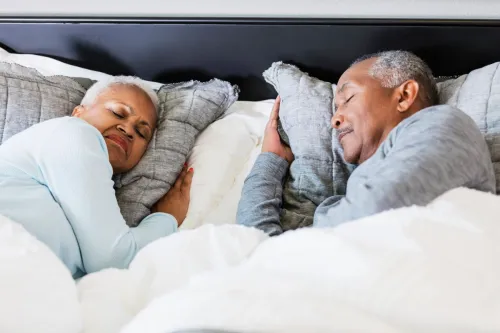
Don't immediately go and raise your bedroom temperature, however. Experts like Chester Wu, MD, a double board-certified psychiatry and sleep medicine physician, caution against taking the study's results at face value for everyone, as it only looked at adults 65 years and older in the Boston area.
"The study doesn't support the idea that warmer environments are better for most people to sleep in, as this is a study of older adults. It also acknowledges 'substantial between-subject variations,'" Wu tells Best Life.
As he further explains, room temperature can impact sleep quality by affecting thermoregulation, "which is a process where the body maintains its core internal temperature." Typically, cooler conditions help facilitate this process during sleep without disruption.
But it's possible that "age-related changes changes in thermoregulation or skin sensitivity" allow older adults to benefit more from warmer sleeping environments as the study suggests, Wu notes.
"Additionally, older adults may have circadian rhythm changes or hormonal balances that make warmer environments more conducive to sleep for them," he says.
Younger adults may want to keep sleeping in cooler temperatures.
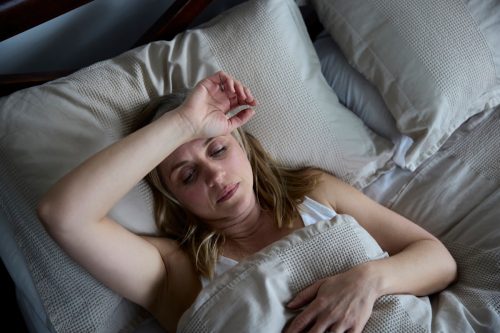
When you sleep, your body temperature is meant to fluctuate in sync with your circadian rhythm in order to promote a "healthy sleep pattern," Shelby Harris, PsyD, licensed clinical psychologist and director of sleep health at Sleepopolis, tells Best Life.
"If the room is too warm, it can disrupt these stages, leading to more sleep disruptions and interfering with overall sleep quality," she shares.
That's why both Wu and Harris believe that warmer sleeping environments should not be recommended for most people.
"For the majority, a cooler room temperature, typically around 67 degrees Fahrenheit, is more conducive to sleep," Harris says. "The optimal temperature range for sleep is between 60 and 69 degrees Fahrenheit for most people."
For more health advice delivered straight to your inbox, sign up for our daily newsletter.





















